英语正反译法练习
- 格式:doc
- 大小:31.50 KB
- 文档页数:1
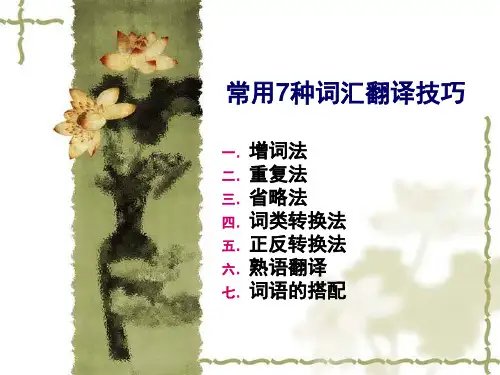
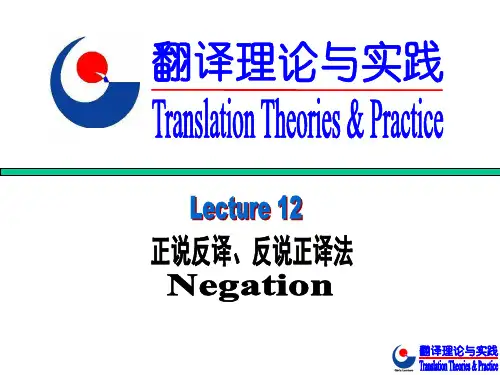
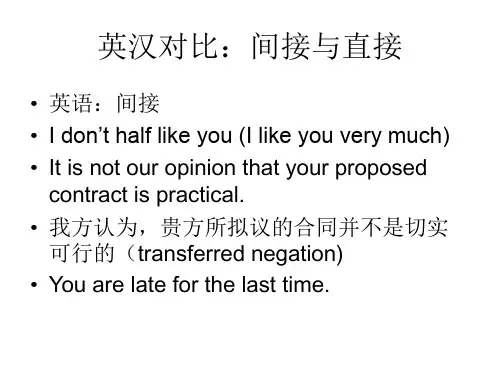
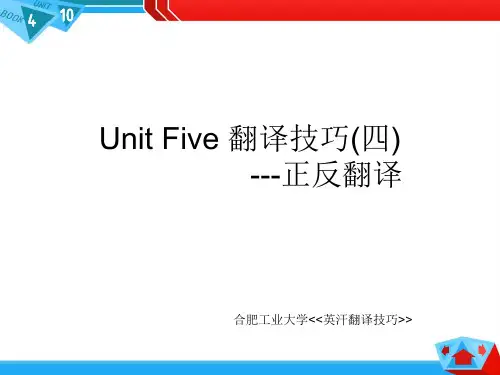


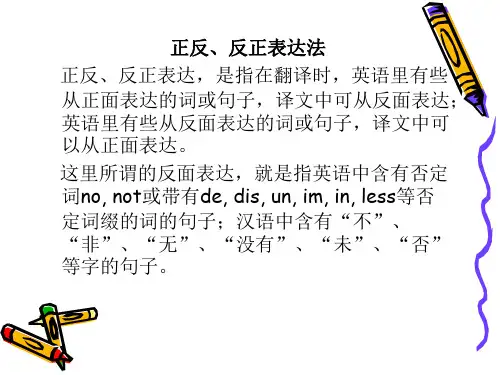
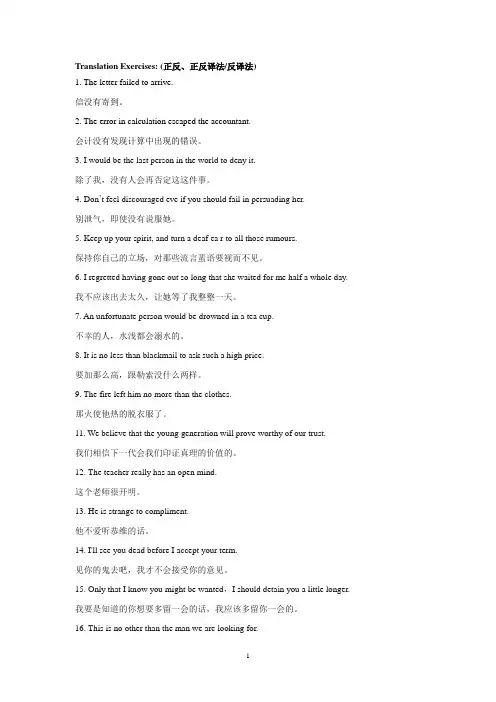
Translation Exercises: (正反、正反译法/反译法)1. The letter failed to arrive.信没有寄到。
2. The error in calculation escaped the accountant.会计没有发现计算中出现的错误。
3. I would be the last person in the world to deny it.除了我,没有人会再否定这这件事。
4. Don’t feel discouraged eve if you should fail in persuading her.别泄气,即使没有说服她。
5. Keep up your spirit, and turn a deaf ea r to all those rumours.保持你自己的立场,对那些流言蜚语要视而不见。
6. I regretted having gone out so long that she waited for me half a whole day. 我不应该出去太久,让她等了我整整一天。
7. An unfortunate person would be drowned in a tea cup.不幸的人,水浅都会溺水的。
8. It is no less than blackmail to ask such a high price.要加那么高,跟勒索没什么两样。
9. The fire left him no more than the clothes.那火使他热的脱衣服了。
11. We believe that the young generation will prove worthy of our trust.我们相信下一代会我们印证真理的价值的。
12. The teacher really has an open mind.这个老师很开明。

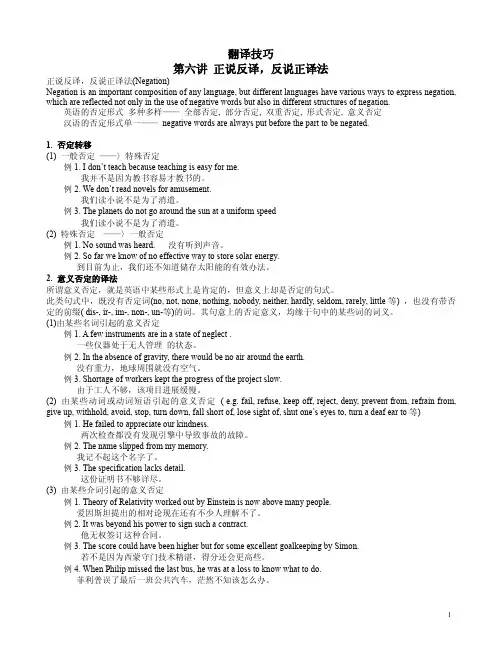
翻译技巧第六讲正说反译,反说正译法正说反译,反说正译法(Negation)Negation is an important composition of any language,but different languages have various ways to express negation, which are reflected not only in the use of negative words but also in different structures of negation.英语的否定形式多种多样——全部否定,部分否定,双重否定,形式否定,意义否定汉语的否定形式单一——negative words are always put before the part to be negated.1.否定转移(1)一般否定——〉特殊否定例1.I don’t teach because teaching is easy for me.我并不是因为教书容易才教书的。
例2.We don’t read novels for amusement.我们读小说不是为了消遣。
例3.The planets do not go around the sun at a uniform speed我们读小说不是为了消遣。
(2)特殊否定——〉一般否定例1.No sound was heard.没有听到声音。
例2.So far we know of no effective way to store solar energy.到目前为止,我们还不知道储存太阳能的有效办法。
2.意义否定的译法所谓意义否定,就是英语中某些形式上是肯定的,但意义上却是否定的句式。
此类句式中,既没有否定词(no,not,none,nothing,nobody,neither,hardly,seldom,rarely,little等),也没有带否定的前缀(dis-,ir-,im-,non-,un-等)的词。
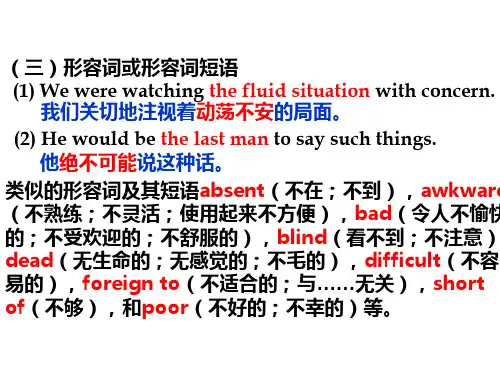
第三章词汇翻译第四节正反、反正表达法一、英文从正面表达,译文从反面表达1.He seemed to be at a loss for precise word to complete his thought.2.Tom said her handling of the matter left very much to be desired.3.Her face was streaked with dirt and her hair was a tangle; even so, you could see her prettyfeatures.4.Jim uses his hands and body beautifully, while Tom has zero body language.5.He dived into the water fully clothed and rescued them.6.Appearances are deceptive.7.The demands seemed less than reasonable.8.Disaster wears many masks.9.Her husband hates to see her stony face.二、英文从反面表达,译文从正面表达1.Evidently he had the first quality of an angler, which is not to measure the pleasure by thecatch.2.Mexico City is an earthquake zone and earth tremors are not unusual.3.He never spared himself and so he made me work hard.4.Don’t make your conclusion before the end of the year.5.He returned home with no hope on his face.。
⏹在翻译时,对于中国学生来说,某些否定句犹如陷阱,稍有不慎,就会掉入其中。
鉴于此,我们在翻译某些含有否定意义的句子时,应当把握两点:一、英语里有些从正面表达的词或句子,译文可从反面来表达,即正说反译法;二、英语里有些从反面表达的词或句子,译文可从正面来表达,即反说正译法。
例如:⏹1) Only five customers remained in the bar.⏹酒吧间只有五个顾客还没走。
⏹(原文从正面表达,译文从反面表达。
如译成“还留着”,或“还呆在那里”,则不如“还没有走”更符合汉语习惯。
)⏹2)Anyone wants to get out? Over my dead body!⏹只要我活着,谁也别想出去。
(the original English sentence implies “nobody can get out unless you kill me).⏹3) Mother said Father would come soon, but Mary knew better.⏹妈妈说爸爸很快就会来了,玛丽知道不会。
(“know better” implies that Mary thoug ht differently or disagreed with Mother, it means “think otherwise”)⏹5) A radar screen is not unlike a television.⏹雷达荧光屏跟电视荧光屏一样。
⏹(如译成“雷达荧光屏不是不象电视荧光屏一样”则不符合汉语习惯。
)⏹我们可以看到,正面译不顺,不妨从反面译;反面译不顺,不妨从正面译,因为同一个概念,一个民族正面说,认为是合乎表达习惯的,而另一个民族则认为反着说才顺嘴。
⏹下面从正说反译和反说正译这两个方面来探讨英语否定结构汉译的一般原则⏹一、正说反译法(Affirmative in English, but Negative in Chinese)⏹英语中的含蓄否定词或含蓄否定短语一般都要译成汉语的否定词组。
正反译法练习之一
1.The newspaper accounts are far from being true.
报纸上的报道一点儿也不真实。
2.Mr. Thompson was above reproach.
汤姆森先生的行为是无可非议的。
3.Keep dry and the top side up!
请勿倒立,防止受潮!
4.Such a chance was denied to me.
这个机会跟我无缘。
5.All are not thieves that dogs bark at.
被狗叫的人不一定都是贼。
(犬之所吠,并非皆贼)
6.He kept himself apart from the other children.
他和其他孩子保持距离,一个人待着。
7.No deposit will be refunded unless ticket produced.
如果不出示票据,押金是不会返还的。
8.他决不会说出这样的话.
He should never have dreamt of saying such a thing.
9.她抱怨名单上没有她的名字.
She complained about her name should be on the list.
10.他尽力克服技术资料的不足.
He tried his best to overcome the lack of technical data.
11.在收据尚未签字以前不得付款.
Don’t pay unless the receipt was signed.
12.他上火车站去接他的朋友,可是在人群中没见到他。
(miss)
He goes to the railway station to meet a friend, but he missed his friend in the crowd.
13.他直到三年级才认识到广泛阅读的重要性。
(not…until)
He did not realized the importance of the wider reading until three grade.
14.我警告过你,不要跟陌生人谈论我的事。
(warn against)
I have warned you against talking about me with strangers.。